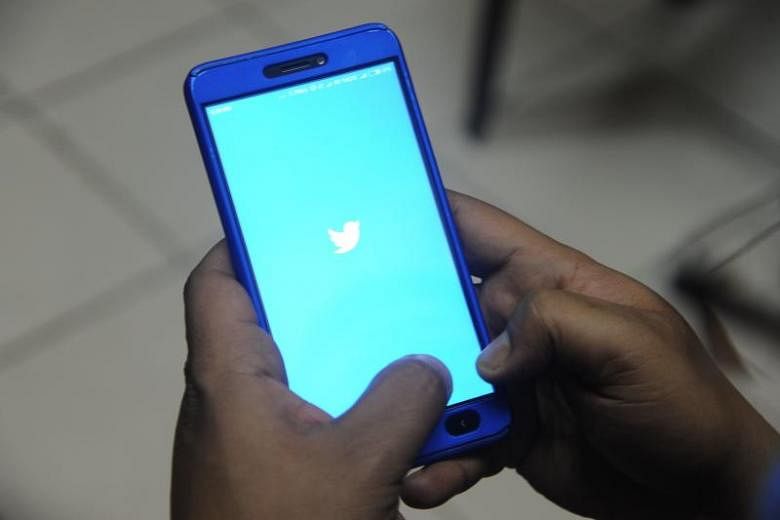NEW DELHI - Ms Priyanka Chaturvedi, who belongs to the Shiv Sena political party based in the western state of Maharashtra, has faced rape threats against her and her daughter on social media.
She has also been the target of online stalking by a man, and rumours being spread of her being in multiple relationships.
"The best way to pull a woman down is first to slander, character assassinate and issue threats like rape, sexual molestation. It is either an individual or through a strategy or group of people attacking you on the basis of your political views," said Ms Chaturvedi, who was with the Congress Party but switched to Shiv Sena in 2019.
"I became a target because I hit where it hurts the most. I use words to communicate what I feel," she added. "People are not comfortable with a woman making a valid point on argument and expressing strong views on issues."
According to a recent study by Amnesty International India, Indian women politicians experienced substantially higher abuse on social media than their UK and US counterparts.
The study, "Troll Patrol India: Exposing Online Abuse Faced by Women Politicians in India", reviewed 114,716 tweets of 95 Indian women politicians in the three months from March to May 2019, before and after last year's general election.
It found one in every seven tweets regarding Indian women politicians to be "problematic" or "abusive".
"It has become easy to target and silence women," said Ms Chaturvedi, 40. "A lot of women are being trolled, so (many) women don't want to talk about politics (online). I have the unique opportunity of being trolled by both sides - the right and left wings."
She has filed two complaints with the local police since 2016, including for the rape threats against her and her then 10-year-old daughter, resulting in two men being arrested and released on bail after a brief period. Both court cases were closed after an apology issued by the men.
A third case was filed by the Mumbai police against a man who posted online that he wished the most horrific rape on her. The case ultimately fizzled out.
"I drew a line as to how much abuse is acceptable and set a trend in motion," Ms Chaturvedi said, referring to more female politicians pursuing cases against online abusers."We have various acts but women don't use the law as they don't get cooperation from the police."
The Amnesty International study found that women politicians from non-Bharatiya Janata Party (BJP) parties experienced 56.7 per cent more problematic or abusive content, while those from rival party Congress received 45.3 per cent more abusive or problematic content than BJP.
Yet BJP politicians dismissed this as a "myth".
The late Sushma Swaraj, who was external affairs minister, was abused by trolls - one of whom even asked her husband to beat her up for supporting an interfaith couple in 2018.
"It is such a myth that only women from Congress or (the) left are harassed," said Ms Shazia Ilmi, 49, a former journalist turned politician, who started out with the Aam Aadmi Party but is now with the BJP.
"There should be some mechanism or AI technology that cuts out abusive material. I have seen morphed videos, morphed photos, pornographic stuff. It's quite ugly. It is very hurtful."
Muslim women politicians received 94.1 per cent more ethnic or religious slurs than those from other religions, the study reported.
"Leftists and liberals are so good at setting the agenda. The kind of filthy things I am subjected to is terrible. I am a Muslim woman who has chosen to be in the BJP. All kinds of things are said to me, whether I am a good Muslim or bad, such as, I sold my soul and body. It's very ugly... I will take what men are subjected to. I don't want comments on my anatomy, body and sexually explicit innuendo."
India has many women excelling in various fields but still remains in many parts a patriarchal society.
Women are poorly represented in India's political system even though the Lower House of Parliament at present has the highest number of women representatives since Independence. There are 78 elected women MPs, accounting for 14.39 per cent in a 543-seat Lower House. In 2014, women accounted for 11 per cent of the MPs.
India was 149th in a 2019 list of 193 countries ranked by the percentage of elected women representatives in their national parliaments, coming behind neighbours Pakistan, Bangladesh and Afghanistan.
Patriarchy, women politicians said, is reflected in the kind of online abuse that takes place in Indian society.
Congress national spokesman Sushmita Dev has been called a slave of the party's president, Mr Rahul Gandhi, among others.
"It's quite humiliating in the sense there are two types of abuse. One is abuse; another is sexist kind of abuse directed purely at women. It creates a deterrent to expressing your views openly in public," said Ms Dev, 47.
"There was a time it used to bother me and was emotionally traumatic. I have grown a thick skin. I don't even look at it (abusive messages) any more. Otherwise I can't survive."
Women MPs believe the way to create deterrence is to sensitise police into filing such cases immediately and for all political parties to take a zero-tolerance approach to misogynistic online abuse against women politicians.
And then there are others who said no amount of abuse would prevent them from airing their views.
"I never read the abuse that trolls put out, but yes it is a big thing, not just for women. The BJP's troll army works overtime to abuse all opposition leaders and make it seem like normal people are doing it," said Ms Mahua Moitra, 44, of the Trinamool Congress, a party based in West Bengal.
"If online abuse deters you, then best stay home and watch TV."


